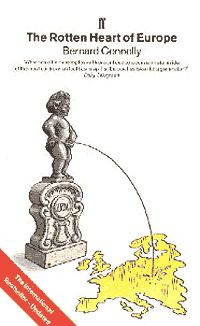| Book Review Archive 08.09.02 [48] |
|
||||
|
The Dirty War For Europe's Money by Bernard Connolly
'Europe will be built through a currency, or it will not be built at all.' said the EEC's founding fathers, or put another way 'One Reich, one money'.
At the center of the Europlot is the uneasy relationship between France
and Germany, but this is a one way street. The political independence of
the Bundesbank cuts against the French political and economic weakness,
as an unequal partnership. The public cannot be told, the Eurocrats are
'liars and cheats'. The truth is not allowed to be told about the 'Franc-Fort'.
He describes one incident, where in June 1993 [page 308] during the terminal
crisis of the ERM, where a French Treasury official, Edmond Alphandery,
arrogantly and publicly called Bundesbank officials to France to try to
order them to cut German interest rates. An official overlooking financial
news screens said the game was up for the ERM 'Alors, c'est bien foutu, le systeme'. ('The system is well and truly fucked') Alphandery is described
as 'The man who told the truth about the ERM'. This is how fragile the Euro system is.
UNLEASH THE DRUNK MADMEN
Part of it is to do with the difference between the economies. Denmark and
Benelux, Germany and France, Portugal, Spain and Italy, and Ireland. It
breaks apart into separate zones, which run at different speeds, with the
weaker economies dragging down the strong. The unification of Germany after
the November 1989 collapse of the Berlin Wall threw a spanner in the works.
The villains of the piece are the 'Enarques' - graduates of the Ecole Nationale,
French senior civil servants, characterized as arrogant and stupid beyond
belief. The rot at the heart of Europe is depicted as a conspiracy by the
Enarque caste to capture control of the Bundesbank. Were they to do this,
Europe's economy would be wrecked. Putting the Enarques in command would
be like letting a drunk madman drive the car.
LOADSAMONEY... ?
Nigel Lawson is blamed for destroying the late 1980s boom, destroying the
'feel good factor' and bringing in the 1990s recession. Lawson cut UK interest
rates before the May 1987 General Election, to engineer a spending boom,
but thereafter things began to go horribly wrong. The series of stock crashes
starting on 16th October 1987 undermined confidence. Lawson abolished double
mortgage relief, generating a rush to beat the deadline which first helped
push house price increases up to 30% p.a. and then brought negative equity.
It was Nigel Lawson's obsessive shadowing of the ERM which did most damage,
doubling inflation from 7.5 to 15%, Connolly believes. Lawson and Geoffrey
Howe conspired together to bounce Margaret Thatcher into the Maastricht
Treaty. 'The Chancellor, as well as the Prime Minister, was taken for a ride by the Foreign Office, the sort of ride you don't come back from'
[p 70]. Correctly, Norman Tebbit described the ERM as the 'Eternal Recession
Mechanism'.
BUCCANEER CAPITALIST CURRENCY SPECULATORS TO THE RESCUE
If these 'toothless tigers and tearful clowns' like Lawson, Leon Brittan, Douglas Hurd and Thatcher's 'nerdish' successor, John Major, are at fault,
Connolly's heroes are the free market currency speculators. George Soros,
for example, who had a $10B war chest. Soros later wrote a defiant letter
to The Times (9th June 1993) attacking the policies of the Bundesbank.
'You can't buck the markets'. Deepening recessions and rising inflation caused by this 'one size fits all' banding of currencies, with currency
speculators pesetas, liras and quids in against their central banks' incapacity
to devaluate, and pathological unwillingness to help each other. Norman
Lamont was singing in the bath after 'White Wednesday' and the booting of
Britain out of the ERM.
KNOCKABOUT PREJUDICE
Some of this is straightforwards knockabout stuff, almost Sun like 'Up Yours
Delors!' rhetoric; the characterization of French politicians kowtowing
to the Bundesbank as 'Vichyites' or comparing Eurocrats' thinking to the
Nazi science of Meteorology. Dr Bernard Benning, chairman of the Bundesbank,
first tried out a forerunner to the ERM back in 1941 as an instrument of
policy for the Nazi Reichsbank. Much of this is from the Basil Fawlty 'Don't
mention the War' school of diplomacy. There is also an unpleasant anti Roman
Catholic feeling to it [eg p 170]; in the relish with which he tells us
that Tietmeyer, a Bundesbank official, is a product of a Jesuit Theological
College in Westphalia, or the nasty way he criticizes the Irish Catholic
Church for their hostility towards his precious currency speculators [p
224] as 'get rich quick and don't care who suffers'. This mars an otherwise interesting book. This idea that money trading takes place in a moral vacuum
needs challenging, but this is not covered here. Unemployment leads to social
disorder, which creates fear of crime, strengthening right wing parties
electorally, and building up the racist search for scapegoats. Nevertheless,
the EC is a superstate, and needs opposing. In my opinion, the facts described
in this book go a long way towards exposing the corruption inside this European
superstate, even if the author's belief in the free market is wrong.
|
|||
|
BLUE is looking for short fiction, extracts of novels, poetry, lyrics,
polemics, opinions, eyewitness accounts, news, features, information and arts
in any form relating to eco cultural- social- spiritual issues, events and
activites (creative and political). Send to Newsdesk. |


 Green Anarchist:
Green Anarchist: